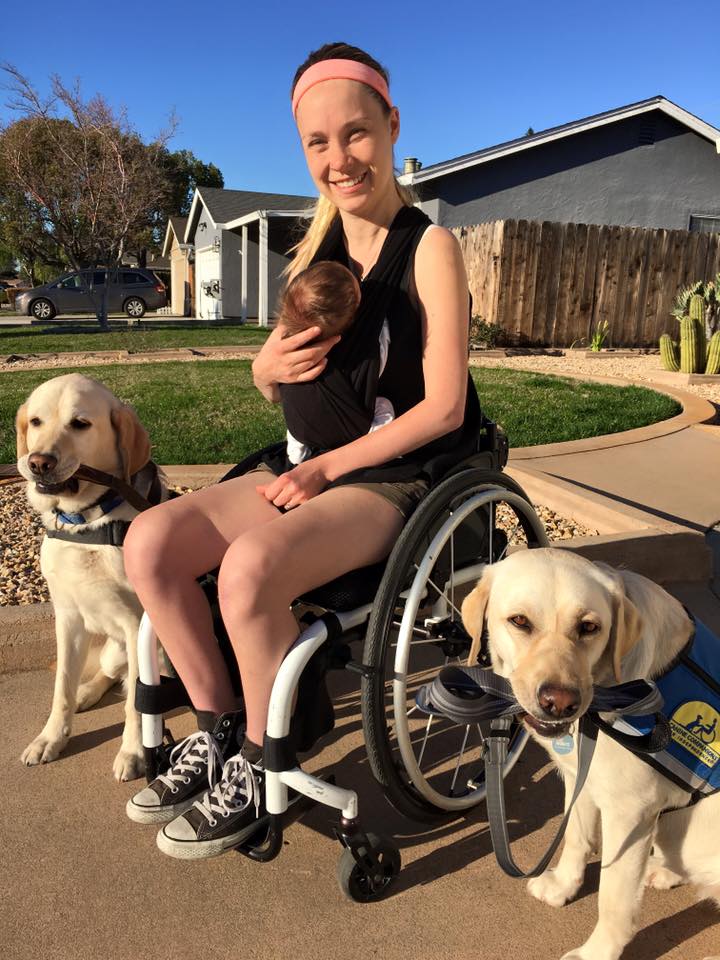As I mentioned in the previous post, I participated in a panel on adaptive babywearing and parenting last week. It got me thinking about the term adaptive. Honestly, I don’t think I wear or parent my baby much differently from the average parent, so I wonder, why do we feel the need to call it, or anything else for that matter, adaptive, specifically in the world of parenting? It feels like a word that’s slapped in front of just about everything people with disabilities do.

According to the dictionary, adapt means to make something suitable for a new use or purpose.
In light of that definition, I get it in certain contexts. Adaptive sports, for example. Traditional basketball has a specific set of rules meant for players who have a typical range of physical abilities. In order for people outside that range to play, the rules had to be changed. Therefore, the game was adapted.
Adaptive cooking. Ok, maybe. Perhaps a wheelchair user had to hollow out the space under the sink and stovetop and lower the countertops. So the kitchen is adapted. But when it comes down to it, do I stir a pot of sauce differently than the next guy? And to take it a step further, able bodied folks remodel kitchens to meet their needs and preferences all the time. No one calls that an adaptation.
If I choose a specific product because it meets my needs better than another, am I adapting, or just making a smart purchase? It would be really hard for me to tie a wrap, but the Baby K’tan serves the same function and there’s no tying involved, so I use it. I’m not repurposing it; it’s meant to allow adults to carry babies, and I am an adult (usually) carrying a baby. I may recommend it to a parent with a toddler and and infant (no time to tie) or someone on a budget (it’s significantly less expensive than a woven wrap). I may also recommend it to a wheelchair-using friend because it’s easy to put on sitting down. Is it adaptive for that third person, but not the first two?
My point is that it seems like to put the qualifier adaptive in front of every activity a disabled person does just serves to further set us apart from the able bodied crowd. When we call something adaptive, we’re agreeing that there’s a normal way to do it and an abnormal way, rather than a spectrum of ways, all equally effective. If the way I parent is qualified as adaptive, I’m less likely to feel part of a community of able bodied parents. It puts us on different planes, and one of the implications is that we may not have much to offer each other in terms of advice or support. How isolating.
To the contrary, though, the wider variety of experiences we can draw on, the better we’ll all be. I don’t exclusively seek out the advice of disabled parents because I know that my able bodied friends are smart, creative people, and will help me find means to an end if their method doesn’t work for me. The nature of being a person with a disability is that you may never meet another person with exactly the same limitations as you, so it’s important to lean on whoever is willing to help, regardless of their status as able bodied or disabled. If you’re very tall, it’s nice to know another very tall person who might be able to recommend a good place to buy pants, but if my 5’4″ self saw that my favorite store just opened a tall section, you’re not going to reject my advice, are you?
Maybe if we approach things from the spectrum perspective, we’ll be looking at a more inclusive future. One where parents with disabilities don’t feel inadequate, and tall people have an easier time finding pants.
Now, if you’ll excuse me, I need to go take an adaptive shower and eat some adaptive lunch.
😉